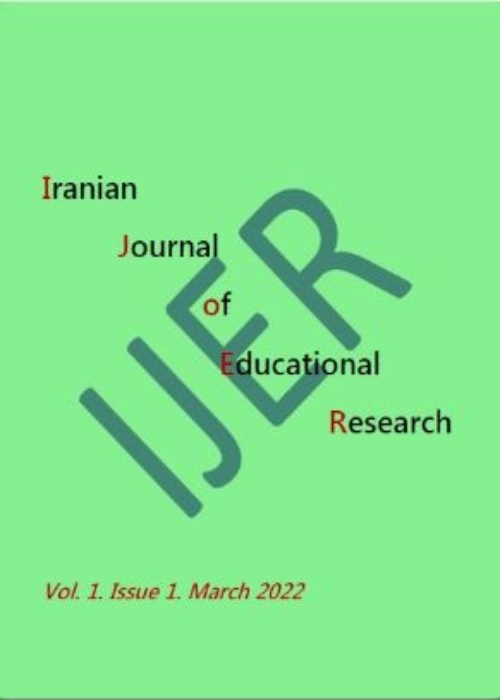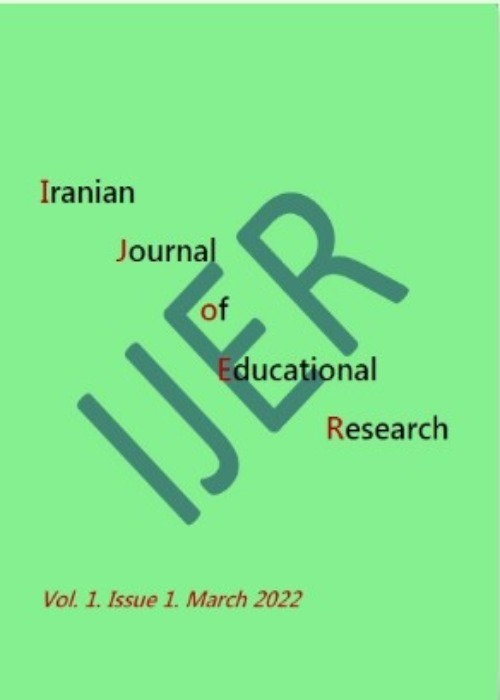فهرست مطالب

Iranian Journal of Educational Research
Volume:2 Issue: 2, Spring 2023
- تاریخ انتشار: 1402/05/10
- تعداد عناوین: 6
-
-
Pages 1-14Objective
The current study aimed to examine the structural model of the dimensions of academic engagement with rumination and cognitive-behavioral avoidance mediated by self-efficacy in high school students of Marvdasht (Iran).
MethodsThe present study is applied research according to its purpose and based on its nature, it is a correlational study using structural equation modeling method. The population included all female high school students in Marvdasht in 2022. The sampling method was a multi-stage cluster in which 300 people were selected. The Sherer's Genenal Self-Efficacy Scale (SGSES), Ottenbreit & Dobson's Cognitive Behavioral Avoidance Scale, Nolen-Hoeksema's Rumination Scale and Shuffle and Becker Academic Participation Scale.
ResultsResults showed that academic engagement has a significant relationship with rumination and cognitive-behavioral avoidance. Also, rumination and cognitive-behavioral avoidance based on the mediating role of self-efficacy were able to predict academic engagement. According to the fit indices, the final model showed a good fit to the data.
ConclusionsRecognizing the pivotal role of self-efficacy as a mediator underscores the significance of interventions aimed at strengthening students' belief in their abilities. This holistic approach to student support can lead to improved academic engagement and mental well-being, ultimately benefiting both individual students and the broader educational community.
Keywords: Self-efficacy, cognitive-behavioral avoidance, rumination, academic engagement -
Pages 15-26Objective
This study investigates the interplay between incremental intelligence mindset, motivational beliefs, academic competence, and academic self-efficacy among university students. The primary objective is to explore how these psychological factors collectively influence academic adjustment
MethodsIn a correlation study, a sample of university students (n=300) from Islamic Azad University of Marvdasht, participated in the research, providing responses to validated self-report questionnaires.
ResultsThe results reveal that the proposed model, consisting of incremental intelligence mindset, motivational beliefs, and academic competence, significantly explains academic adjustment (F=8.52, p<0.001). Furthermore, the model explains 47.9% of the variance in academic self-efficacy (R-squared=0.49). Specifically, incremental intelligence mindset (β=0.25, p<0.001), motivational beliefs (β=0.38, p<0.01), and academic competence (β=0.23, p<0.010) positively and significantly predict academic self-efficacy.
ConclusionsThese findings highlight the substantial impact of these factors on students' self-perceived academic efficacy. The implications of these results are profound for educational institutions and practitioners. Understanding the influential role of incremental intelligence mindset, motivational beliefs, and academic competence in shaping academic self-efficacy can inform targeted interventions to enhance students' academic experiences and outcomes.
Keywords: Academic Self-efficacy, Incremental Intelligence Mindset, Motivational Beliefs, University Students, Academic Competence -
Pages 27-40Objective
The aim of the present study was to compare the effectiveness of collaborative teaching method with brain-based teaching method on students' social competence.
MethodsThe statistical population consisted of students studying in the academic year 2021-2022 in the middle school level of District 2, Tehran. Then, a total of 36 students were purposefully selected and randomly assigned to three groups: collaborative teaching method group (12 students), brain-based teaching method group (12 students), and control group (12 students). In the experimental groups, collaborative teaching method and brain-based teaching method were implemented in ten 50-minute sessions. These two groups underwent training using these methods, while the control group did not receive any form of training or intervention. The data were collected using the Flener's Social Competence Questionnaire (1990). Data analysis was conducted using analysis of covariance (ANCOVA).
ResultsThe results indicated that both collaborative teaching method and brain-based teaching method were effective on social competence. Individuals who received training using the collaborative teaching method achieved higher scores in social competence after the intervention compared to those who received training using the brain-based teaching method, demonstrating the greater efficacy of the collaborative teaching method over the brain-based teaching method.
ConclusionEducational practitioners and policymakers can use these insights to make informed decisions about teaching strategies that best serve the holistic development of students, ultimately contributing to their overall well-being and success in academic and social domains.
Keywords: Brain-based teaching, collaborative teaching, social competence, students -
Elementary School Teachers’ Math Teaching Efficacy Beliefs and Job Motivation: A Correlational StudyPages 41-51Objective
This correlational study investigates the relationship between elementary school teachers' mathematics teaching efficacy beliefs and their job motivation in Mashhad, Iran.
MethodsThe research explores how teachers' confidence in their ability to teach mathematics effectively relates to their motivation to engage in their teaching profession. The participants in this study are 250 elementary school teachers from Mashhad. Data were collected through validated self-report questionnaires that assessed both mathematics teaching efficacy beliefs and job motivation. Statistical analyses, including correlation and regression, were utilized to analyze the data.
ResultsThe results provide insights into the potential influence of teachers' self-perceived effectiveness in teaching mathematics on their overall job motivation.
ConclusionsThis study contributes to the understanding of the interplay between teachers' beliefs in their teaching abilities and their intrinsic motivation to excel in their profession, particularly in the context of mathematics education.
Keywords: Elementary school teachers, mathematics teaching efficacy beliefs, job motivation, correlational study -
Pages 52-63Objective
This study examines the interplay between self-efficacy, resilience, academic engagement, and the mediating role of psychological hardiness among a sample of 182 students at the Islamic Azad University of Bandar Abbas. Furthermore, the study explores the potential mediating role of psychological hardiness in this relationship.
MethodsThe research investigates the extent to which students' beliefs in their capabilities (self-efficacy) and their ability to adapt and rebound from challenges (resilience) relate to their active participation and involvement in academic activities (academic engagement). Data were collected through self-report questionnaires measuring self-efficacy, resilience, psychological hardiness, and academic engagement. Statistical analyses, including correlation and mediation analyses, were conducted to uncover the complex interactions among these variables.
ResultsThe findings shed light on the pathways through which self-beliefs and psychological strengths influence students' academic engagement.
ConclusionsThis research contributes to our understanding of the psychological factors that impact students' academic experiences and outcomes.
Keywords: Self-efficacy, resilience, academic engagement, psychological hardiness -
Pages 64-73Objective
The main objective of the present study was to investigate the efficacy of life skills training in enhancing the academic performance of students.
MethodsIn order to achieve this goal, a semi-experimental pretest-posttest design with a control group was employed. The target population for the research consisted of all female elementary students in the sixth grade residing in Baharestan city during the year 2022. From this population, a sample of 30 students was selected using convenience sampling and then randomly divided into two groups: an experimental group comprising of 15 students and a control group consisting of 15 students as well. The experimental group underwent the life skills training program, while the control group was placed on a waiting list, not receiving any specific intervention. To assess the academic progress of the participants, a researcher-made Questionnaire was utilized as the research instrument. The collected data were subsequently analyzed using the SPSS version 22 software, employing a one-way analysis of covariance (ANCOVA) as the statistical method.
Resultshe findings of the study unequivocally demonstrated the effectiveness of the life skills training program, which resulted in a significant enhancement in the academic achievement of the students.
ConclusionsThis research study significantly contributes to the advancement of our comprehension regarding the various facets and dimensions of life skills training, which ultimately exert a profound influence on the academic journey and overall educational outcomes of students.
Keywords: Life skills training, academic achievement, students


